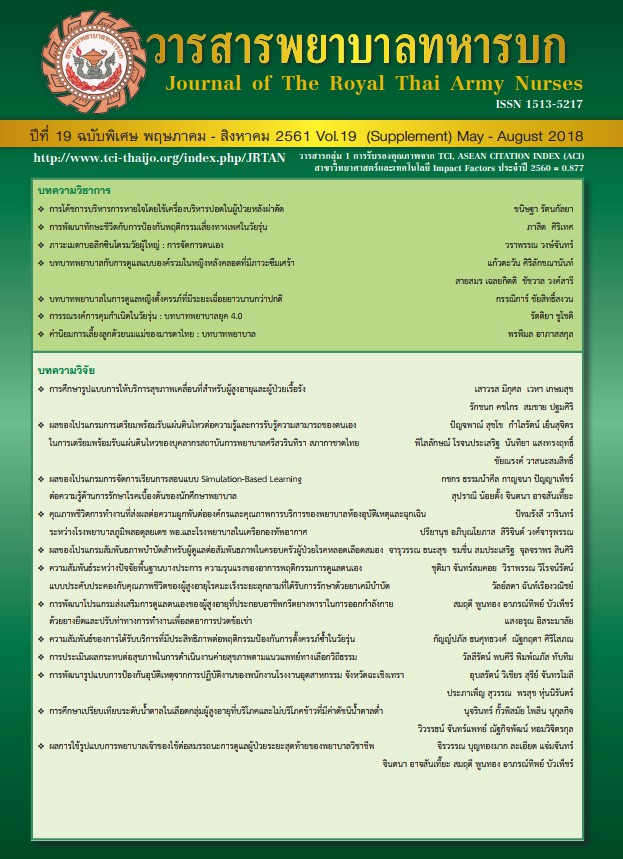A Study of Health Belief Model And The Risk of Type 2 Diabetes in Working Muslim Populations
Keywords:
Health Beliefs Model, Prevention behavior and the risk of type 2 diabetes, Working MuslimAbstract
This study aimed to examine the correlation of health belief model with preventive behavior and risk of type 2 diabetes in working Muslim age 20 – 60 years and registered at Chonburi province mosque, total 219. Data were collected by physical examination and questionnaire which content validity, the CVI was 0.86 – 1.0, reliability was using Cronbach’s alpha coefficient was 0.82 – 0.98 after ethics approval from research committee, Huachiew Chalermprakiet University. Data analysis were frequency, percentage, mean, standard deviation and Pearson Product Moment (p < 0.05) The results show that health belief model in perceived risk of disease ,perceived benefits of prevention behaviors, perceived disease severity and what conducive to practice were positive relationship with type 2 diabetes prevention. But perceived barriers to behaviors for disease prevention was significantly negatively correlated with type 2 diabetes prevention behaviors ( p < 0.05).Anyhow, perceived risk , perceived disease severity, perceived benefits of practice and perceived induction were negatively correlation with body mass index, waist circumference, blood sugar and blood pressure.But perceived barriers has positive correlation with body mass index, waist circumference, blood sugar and blood pressure was statistically significant p < 0.001.
Downloads
References
Jaikhamwang N. Risk behaviors of diabetes and hypertension risk groups: A case study in Ban Pak Ka Yang sub-district health promoting
hospital, Sukhothai province. Journal of community development and quality of life. 2015; 32(3): 51-66. (in Thai)
Becker, M. H., Maiman, L.A. sociobehavioral determinants of compliance with health medical care recommendations. Medical care. 1975; 13: 10-24.
Yuerae K, Limchaiarunreung S, Singhchangchay P. Promoting Islamic exercise in housewives, Pattani province. Journal of graduate school of Islamic university of Yala. 2010; 5: 83-96. (in Thai)
Phaitrakoon J, Chulakarn N. Cultural Understanding of Health in Thai Elderly Muslims Journal of Princess Naradhiwas University.2016;8:142-152. (in Thai)
Hmadsa S. Effects of self-management program on glycemic control behaviors and a1c in Muslim women with type 2 diabetes. Bangkok: Rangsit university; 2010. (in Thai)
Sahaphan A. Factors predicting diabetes prevention behaviors among those at risk for diabetes mellitus. Bangkok: Mahidol university. 2013. (in Thai)
Jindawattanawong A, Peiysue N, Nintajan P. Relationship between perceived health beliefs and protective behaviors of type 2 diabetes mellitus in high school students. Journal of ramathibodi nursing. 2012; 18: 58-69. (in Thai)
Joychoo N, Pinyopasakul W, Chareonkitkarn V.Relationships among Age, Perceived Benefits of Health Behaviors, Perceived Barriers of Health Behaviors and Health Behaviors in Patients with Ischemic Stroke.Ramathibodi Nursing Journal.2014;20:236-248. (in Thai)
Buapum P, Kulrattanawiroj P. Health promoting behaviors of patients with chronic illness in Chainat province. Journal of thaksin university. Issup 2011; 14(3).199-205 (in Thai)
Tangthanapongsa A. Factors affecting health promoting behaviors of diabetes mellitus patients. Nakhon Pathom: Christian university. 2008. (in Thai)
Annesi J, Gorjala S. Relations of self-regulation and self-efficacy for exercise and eating and BMI change: A field investigation. Biopsychosocial medicine. 2010; 10: 12-28. (in Thai)
Khamtanod S, Kengkanpanich T, Tansakul S, Kengkanpanich M. Application of self-efficacy theory to behavior modification diet and physical activity of women with obesity Samkoh hospital, Ang-Thong province. Journal of health education. 2013; 36: 30-44. (in Thai)
Kessin J, Wiruchagool P, Lohnil A. Self-management knowledge, quality of life in new cases with type II diabetes mellitus, pre-post type II diabetes patients self-management program in urban areas, Uthaithani province. Journal of nursing prince of songkhla university. 2013; 40: 84-103. (in Thai)
Intrarwichian S. Changing health behavior by participate to sustainable in the diabetes mellitus risk group, Kasetwisai district, Roi-et province. Journal of disease prevention and control 6. 2012; 19(2): 65-75. (in Thai)
Munkhong K, Kimsungnoen N, Namvongprom A. Comparison of Health Promoing Behaviors of Controlled and Uncontrolled Type 2 Diabetic Patients. Journal of The Royal Thai Army Nurses. 2016;17(3):54-62. (in Thai).
Downloads
Published
How to Cite
Issue
Section
License
บทความหรือข้อคิดเห็นใดใดที่ปรากฏในวารสารพยาบาลทหารบกเป็นวรรณกรรมของผู้เขียน ซึ่งบรรณาธิการหรือสมาคมพยาบาลทหารบก ไม่จำเป็นต้องเห็นด้วย
บทความที่ได้รับการตีพิมพ์เป็นลิขสิทธิ์ของวารสารพยาบาลทหารบก
The ideas and opinions expressed in the Journal of The Royal Thai Army Nurses are those of the authors and not necessarily those
of the editor or Royal Thai Army Nurses Association.






